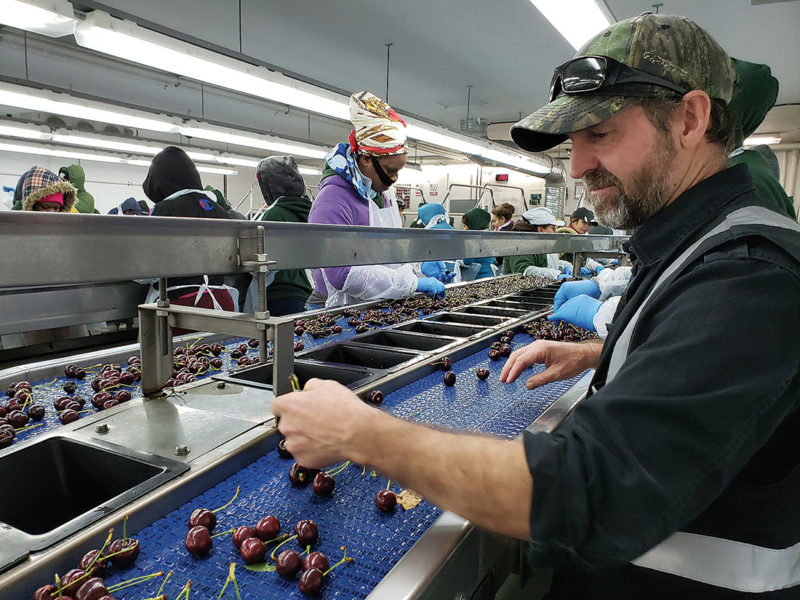LAKE COUNTRY – BC’s cherry industry often refers to 2016 as the Vietnam year because of the sheer number of helicopters used to dry the crop. That harvest, at 17,495 tons, was more than 1,200 tons short of the record 2015 harvest, even though plantings had increased by 150 acres. The loss had a farmgate value of nearly $4.5 million.
But this year’s losses are set to be more than double that. At more than $10 million, it is the industry’s biggest single-year loss ever.
Production Insurance staff have received 436 claims from cherry growers for losses in 2019. As of December 3, the province has paid out $8.6 million.
While new acreage boosted the BC cherry crop to nearly 27,000 tons last year, more than 50% larger than in 2016, the record-setting loss underscores the fact that cherry production is not for the faint of heart.
“The risk in cherries is in the production,” says David Geen, president and owner of Coral Beach Farms Ltd. in Lake Country. “With apples, the risk might be in whether you will get paid.”
Geen says the season was one of the most challenging he’s seen in the last 20 years.
“We had layer after layer of issues that began with winter kill of some fruit buds during the extreme cold in February,” he explains. “Following that, we had some spring frost at flowering and those two events contributed to a 20% reduction in fruit set.”
Growers expect rain in June, but it usually tapers off for a dry July and August. That wasn’t the case this year, with multiple rain events across the Okanagan from the start of harvest on June 20 through to the end of July.
“It was constant,” says Geen. “We would have one or two days of dry and then we’d get another downpour.”
Coral Beach counts on its multiple orchard sites throughout the central Okanagan to mitigate weather-related risks. It farms 750 acres from southeast Kelowna through Lake Country to Cholla Hills above Westside Road and Coldstream, east of Vernon.
“Normally, summer rains in the Okanagan are sporadic thunderstorms that are confined to a relatively small area,” Geen notes. “But this year we had a number of cold lows that settled in right across the whole valley.”
Even a high-elevation site at 2,400 feet in the hills above Lake Country chosen for later ripening was affected.
“It was in really good shape in early August,” says Geen “But starting the ninth and tenth of August we had a long period of wet and that orchard took it on the chin.”
Coral Beach has an aggressive helicopter drying program in addition to using tractors and wind machines. Geen says he hasn’t added up the days or the cost, but he says it was “way higher than average.”
Drying saved plenty of fruit, however.
“We only lost two blocks that were too impacted to pick,” says Geen. “One Skeena and one Rainier, for a total of 14 acres out of the 750 that we have in production.”
The rest of the crop was carefully sorted but Geen estimates that only 70% of that was top-grade fruit. The result was a net loss of about 45%.
BC Tree Fruits, for its part, saw its cherry crop down by more than 20%.
Besides having multiple sites, Coral Beach spreads its risk by planting a range of varieties, many of which come from the federal breeding program in Summerland.
“Besides Skeena, which we know doesn’t like the rain, we have Staccato, Sovereign and Sentennial,” says Geen. “And Sweetheart does particularly well in the North Okanagan.”
Coral Beach does have a 10-acre block rigged for the installation of Voen rain covers to protect the fruit as it ripens to maturity.
“That block got really hammered with spring frost and we decided that the crop load was not big enough to justify the expense of installing the covers,” Geen says.
On the bright side, a smaller crop meant some price compensation for what was left. China, despite shutting out shipments of canola, meat and other products from Canada, was a strong market for cherries thanks to its ongoing trade war with the US.
“The market in China, particularly in August, was very strong,” says Geen.
China continues to be one of the major export markets for BC cherries, and Japan opened its doors to BC fruit this year, too. Exports to the US also remain significant, especially for BC’s late-ripening fruit.
Growers in the Okanagan and Creston valleys continue to increase planting with the help of the province’s long-running replant program. There are bare land plantings going in as well.
Coral Beach planted 58 acres this April at a new site in Pritchard on the north bank of the South Thompson River. An additional 120 acres will follow this spring. The blocks will be in production by 2023.
The growing volume of BC cherries is helping to establish a presence in the world marketplace.
“It is putting us a bit more in the spotlight. Canadian cherries are now a thing,” says Geen. “I think it is helping to establish an offshore brand.”
With files from Peter Mitham


 Small farmers raise concerns about CanadaGAP
Small farmers raise concerns about CanadaGAP